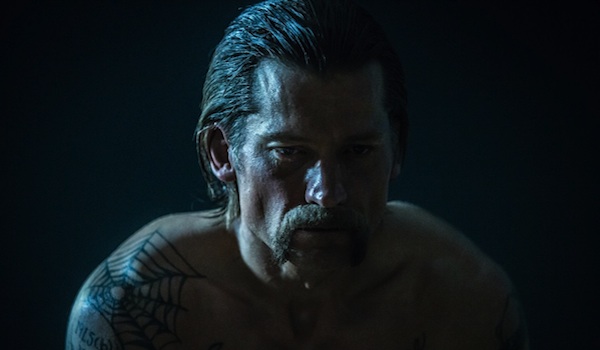
Shot Caller Review
Shot Caller (2017) Film Review from the 23rd Annual Los Angeles Film Festival, a movie directed by Ric Roman Waugh, starring Nikolaj Coster-Waldau, Jon Bernthal, Lake Bell, Emory Cohen, Jeffrey Donovan, Benjamin Bratt, Jessy Schram, Omari Hardwick, Holt McCallany, Michael Landes, Evan Jones, Juan Pablo Raba, Matt Gerald, Sarah Minnich, and Chris Browning.
With prison reform and violent racism on the tip of everyone’s tongue, it was only a matter of time before someone decided to make a movie that takes on both topics. Ric Roman Waugh does this in Shot Caller, a gripping look at what happens when a model family man goes to prison and transforms into a high-ranking member of a white supremacist gang.
Waugh, to his eternal credit, stays safely away from the conventions of the standard message movie and refrains from hammering the audience with platitudes about the evils of racism and mass incarceration. Instead, it passively depicts the behavior and mindset of characters on both sides of the law in the prison system, not so much condemning prison gangs or their captors as it does chronicle their activities and interactions. This dispassionate approach provides the audience with enough detachment from the material to empathize, if not outright sympathize, with Josh “Money” Harlon (Nikolaj Coster-Waldau), the seemingly perfect father who, if he wasn’t a hardened criminal before imprisonment, certainly was afterwards. If we feel like any character, it’s probably his poor wife, played by Lake Bell in a performance that is as heartbreaking as it is impressive for an actress mostly associated with comedic roles.
But the highlight of the film is almost certainly the lead-up to the arms deal Money is tasked with brokering. As the involved parties get ready to meet and the police discretely tail them, they drive through the desert to the agreed meeting place. The screen is pitch black for the most part, with nothing more than the lights of the trucks making their way to their destination to give us a sense of direction, to say nothing of something to see on screen. The camera dutifully follows Money’s truck, tracking along until he pulls up at the spot, his headlights meeting those of the vehicles already there.
Countless movies have used darkness to compose striking shots and intriguing imagery, but few have harnessed it in a way as raw as Shot Caller has. It’s scenes like this that remind us that sometimes, the thing that makes a given scene great is not what happens or is said in it but simply how it looks when it happens or is said. I’m not going to pretend I understand the significance of the scene’s overpowering darkness (although my bet is that it’s probably a metaphor for the figurative darkness that Money has descended into), but I’m damn sure that it’s one of the most mesmerizing I’ve ever seen.
A movie takes as many chances as Shot Caller does easily could have ended up a disaster, but it deftly navigates each risk it takes and leaves viewers with a weighty but fast-paced narrative that makes one think about the uncomfortable fact that there are not only people in the prison system who might have a story like Money’s but that there actually are people who just might belong there. With its combination of social analysis and underworld intrigue, it’s not hard to call Shot Caller a crime drama for the thinking man.
Rating: 8/10
Leave your thoughts on this Shot Caller review and this film below in the comments section. Readers seeking more film reviews can visit our Movie Review Page, our Movie Review Facebook Page, and our Movie Review Google+ Page. Want up-to-the-minute notifications? FilmBook staff members publish articles by Email, Twitter, Tumblr, Google+, and Facebook.